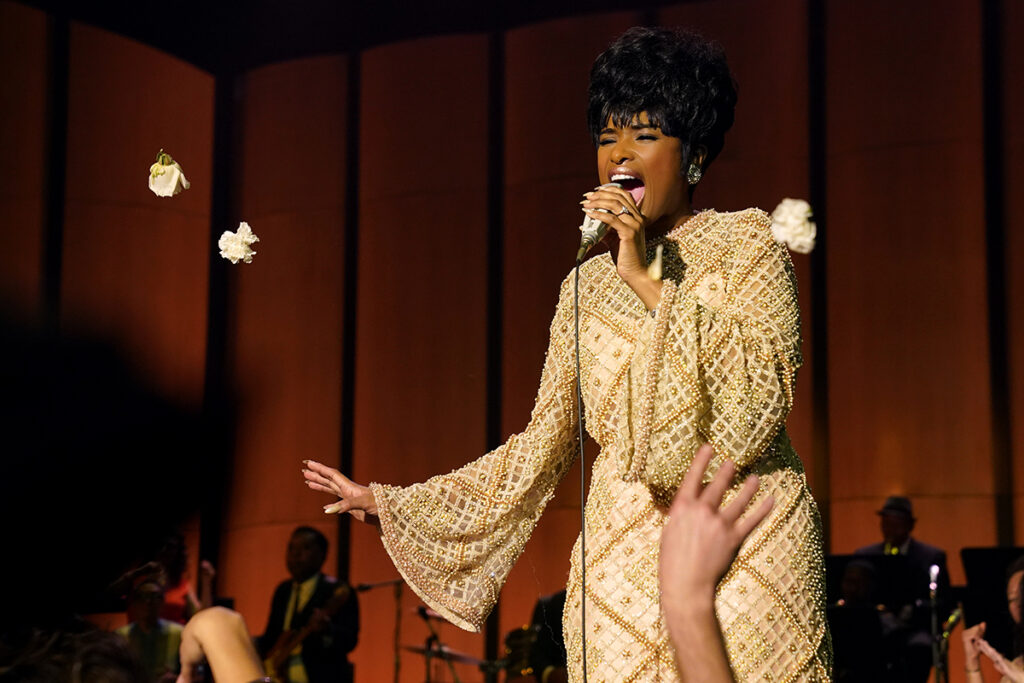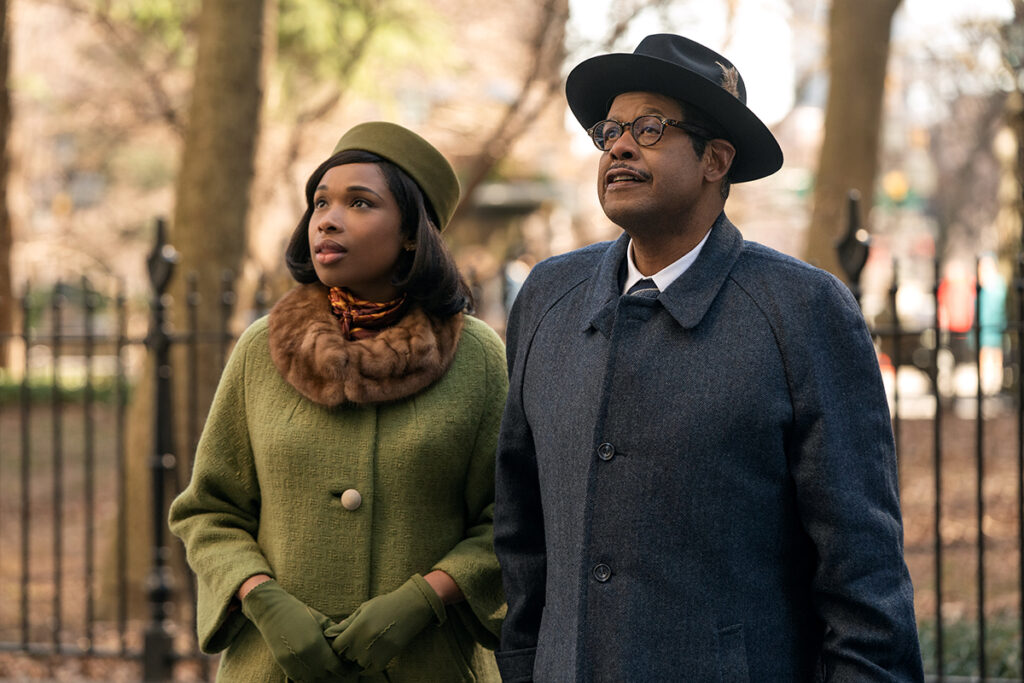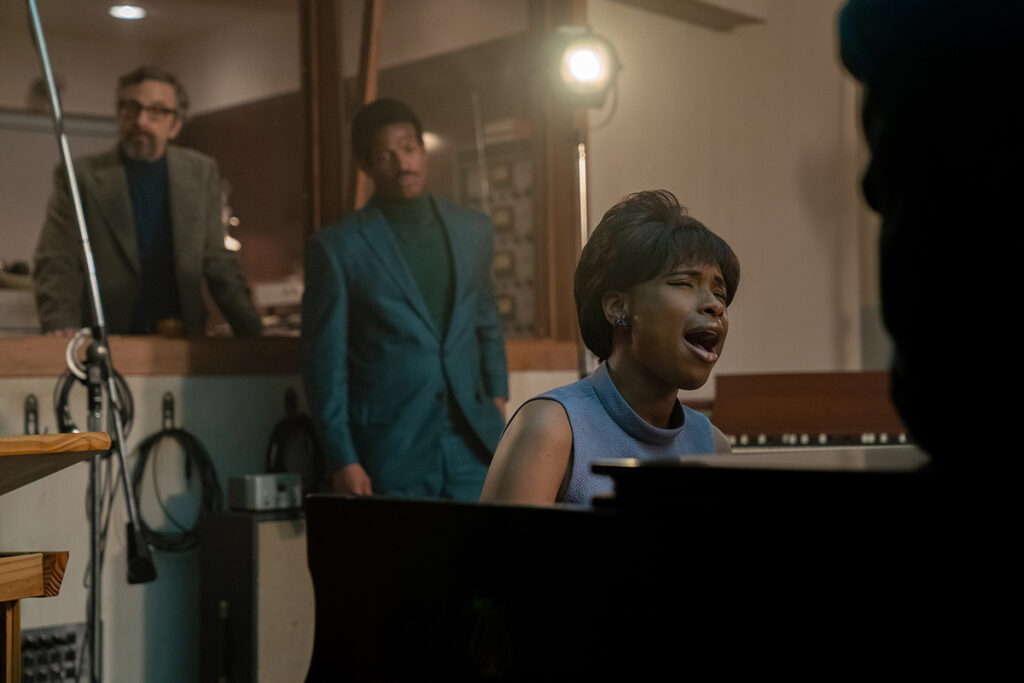In the triumphant final moments of Respect – a film about the celebrated and adored singer Aretha Franklin, with Jennifer Hudson in the lead role – we’re met with a sight familiar to anyone who has ever watched a music biopic: title cards listing the star’s numerous accolades, in an attempt to quantify their talent and success.
It’s perhaps unfair to single out Respect for feeling like the adaptation of a Wikipedia entry, since this is par for the course in a genre whose formula almost always makes a movie feel more like docudrama than fiction proper. But those bland, unambitious and predictable title cards do, unfortunately, come to stand for the whole film, which races through key events, suggests the important themes, but never gives us a sense of its subject’s inner life.

Franklin’s history is, at least, an interesting one. The singer practically grew up amongst music royalty, as we learn in the film’s opening scene. The ten-year-old “Ree” (Skye Dakota Turner) is dragged out of bed by her father, the celebrated Reverend C.L. Franklin (Forest Whitaker), to sing at one of his house parties; there’s Art Tatum at the piano, there’s Sam Cooke being swamped by women, and there’s Dinah Washington (a brief, camp Mary J. Blige cameo) telling a story that ends by informing us that there’s “only one queen. Me. Dinah Washington.” (Get your music biopic bingo card ready.)
Aretha is already an obvious talent, wowing both her father’s guests and his congregation. She also, rather sweetly, sing-talks with her mother (Audra McDonald), who warns her that her father doesn’t own her voice, and that she “don’t ever have to fear any man.”
But soon Ree’s mother is dead and Aretha herself – as we learn in a flashback that is shocking but, to the film’s credit, not particularly salacious – is pregnant at age 12. Aretha’s child is looked after by her grandmother, while her music career is looked after by her increasingly controlling father. In an act of defiance, Aretha swaps him out for Ted White (Marlon Wayans), who becomes her husband and manager. But he’s even worse: jealous, hot-tempered and abusive.

As Aretha inches towards her dreams of making it big – as overseen by the white music producers John Hammond (Tate Donovan) and Jerry Wexler (Marc Maron, in the film’s most entertaining supporting role) – the narrative’s predictable trajectory is that Aretha, in order to transform from the meek, troubled girl we meet at the beginning of the film into the powerhouse Queen of Soul we know and love, must learn to demand the respect she deserves. Along the way, particularly later in the film, there’s no small amount of pleasure to be gained from watching her find her voice. But there’s also the sense that the flattering screenplay has avoided anything too difficult, too messy. Innumerable references to Aretha’s “demons” don’t quite convince us that the film wants to wrestle with them.
Throughout what is (and feels like) a lengthy film, we never get past the surface. So much is hinted at, so little said – this isn’t subtlety, it’s elision that points to a lack of guts on the part of the filmmakers. To be fair, Franklin was by all accounts a notoriously guarded woman; David Ritz, who ghost-wrote her autobiography and later published a biography, describes her in the latter book as “defiantly inscrutable”. But what Respect is in desperate need of is the courage to imagine an interior life for its subject.
Imagination requires risk – here, that’s the risk of deviating from a reliable old formula. It’s also perhaps the risk of upsetting, offending, or alienating Franklin’s friends, fans and family by presenting a portrait that deviates from the officially sanctioned version of the singer and has something to say beyond the obvious. It’s worth mentioning here that, before her death in 2018, Franklin was involved in the movie’s development – in fact, she handpicked Hudson to play her – which may explain some of the screenplay’s limitations. (Ritz: “Self-confrontation was something Aretha neither understood nor welcomed.”)

Admittedly, Hudson was a terrific choice. And it’s largely thanks to Hudson that the film does sporadically find its groove – especially in scenes which showcase Aretha’s strengths as a songwriter. In one, Aretha records “I Never Loved A Man (The Way I Love You)” with a unfamiliar studio band; she adds a dose of gospel, then some swing, then strips back the arrangement until she’s found her sound. Here, we get to see Aretha figuring out what she likes, what she wants; her emerging musical style becomes shorthand for her need for artistic and personal independence. And it goes without saying that Hudson is a fantastic singer – when the filmmakers just let her do her thing, it’s great.
Still, not quite as great as the real thing, as the film misguidedly reminds us in its final scenes. First, we get a recreation of “Amazing Grace” being performed at L.A.’s New Temple Missionary Baptist Church for the live album of the same name. It would be stirring stuff, only I couldn’t help being reminded of seeing the filmed recording of that album (finally released in 2018) at a cinema a few years ago. That film had the audience in my screening on their feet, clapping and cheering between each song, effectively making a church of the auditorium. Respect poses no such risk.
And finally, as the credits roll, we’re treated to Aretha Franklin absolutely killing a rendition of “(You Make Me Feel Like) A Natural Woman” at the 2015 Kennedy Center Honors tribute to Carole King. Aged 73, Franklin’s voice is as powerful, as emotionally loaded as it ever was, and her stage presence is immense; in true diva fashion, she tosses the gigantic fur coat she’s wearing to the floor at the song’s climax. It’s a spectacular performance that inadvertently deals a deathblow to the movie: suggesting that perhaps you would’ve been better off skipping this biopic and going directly to the source.
Respect releases in cinemas Friday 10th September.
